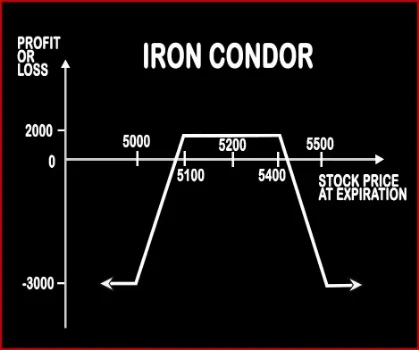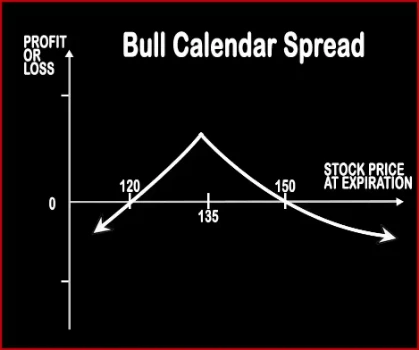Compare Strategies
| IRON CONDORS | BULL CALENDER SPREAD | |
|---|---|---|

|

|
|
| About Strategy |
Iron Condors Option StrategyIron Condor is a neutral trading strategy. A trader tries to make profit from low volatility in the price of the underlying asset. This strategy will be better understood if you recall ‘Bull Put Spread’ & ‘Bear Call Spread’. A trader will buy one Deep OTM Put Option and sell one OTM Put Option,. He will also sell one OTM Call Option and buy one Deep OTM Call Option. |
Bull Calendar Spread Option StrategyThis strategy is implemented when a trader is bullish on the underlying stock/index in the short term say 2 months or so. A trader will write one Near Month OTM Call Option and buy one next Month OTM Call Option, thereby reducing the cost of purchase, with the same strike price of the same underlying asset. This strategy is used when a trader wants to make prof .. |
IRON CONDORS Vs BULL CALENDER SPREAD - Details
| IRON CONDORS | BULL CALENDER SPREAD | |
|---|---|---|
| Market View | Neutral | Bullish |
| Type (CE/PE) | CE (Call Option) + PE (Put Option) | CE (Call Option) + PE (Put Option) |
| Number Of Positions | 4 | 2 |
| Strategy Level | Advance | Beginners |
| Reward Profile | Limited | Unlimited |
| Risk Profile | Limited | Limited |
| Breakeven Point | Upper Breakeven Point = Strike Price of Short Call + Net Premium Received, Lower Breakeven Point = Strike Price of Short Put - Net Premium Received | Stock Price when long call value is equal to net debit. |
IRON CONDORS Vs BULL CALENDER SPREAD - When & How to use ?
| IRON CONDORS | BULL CALENDER SPREAD | |
|---|---|---|
| Market View | Neutral | Bullish |
| When to use? | When a trader tries to make profit from low volatility in the price of the underlying asset. | This strategy is used when a trader wants to make profit from a steady increase in the stock price over a short period of time. |
| Action | Sell 1 OTM Put, Buy 1 OTM Put (Lower Strike), Sell 1 OTM Call, Buy 1 OTM Call (Higher Strike) | Sell 1 Near-Term OTM Call, Buy 1 Long-Term OTM Call |
| Breakeven Point | Upper Breakeven Point = Strike Price of Short Call + Net Premium Received, Lower Breakeven Point = Strike Price of Short Put - Net Premium Received | Stock Price when long call value is equal to net debit. |
IRON CONDORS Vs BULL CALENDER SPREAD - Risk & Reward
| IRON CONDORS | BULL CALENDER SPREAD | |
|---|---|---|
| Maximum Profit Scenario | Net Premium Received - Commissions Paid | You have unlimited profit potential to the upside. |
| Maximum Loss Scenario | Strike Price of Long Call - Strike Price of Short Call - Net Premium Received + Commissions Paid | Max Loss = Premium Paid + Commissions Paid |
| Risk | Limited | Limited |
| Reward | Limited | Unlimited |
IRON CONDORS Vs BULL CALENDER SPREAD - Strategy Pros & Cons
| IRON CONDORS | BULL CALENDER SPREAD | |
|---|---|---|
| Similar Strategies | Long Put Butterfly, Neutral Calendar Spread | The Collar, Bull Put Spread |
| Disadvantage | • Full of risk. • Unlimited maximum loss. | • Limited profit even if underlying asset rallies. • If the short call options are assigned when the underlying asset rallies then losses can be sustained. |
| Advantages | • Chance to gather double premium. • Sure, maximum gains on one-half the trade. • Flexible and double leverage at half price. | • Limited losses to the net debit. • Enable trader to book profit even if underlying asset stays stagnant. • If the market trends reverse, cashing in from stock price movement at limited risk. |